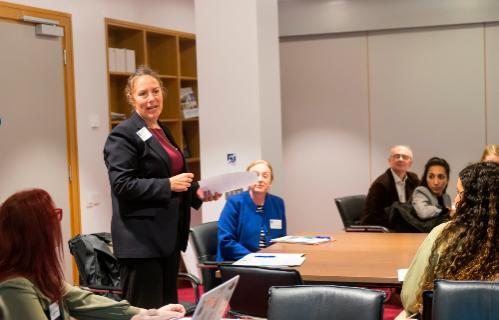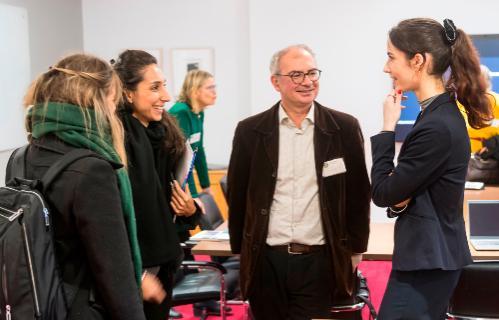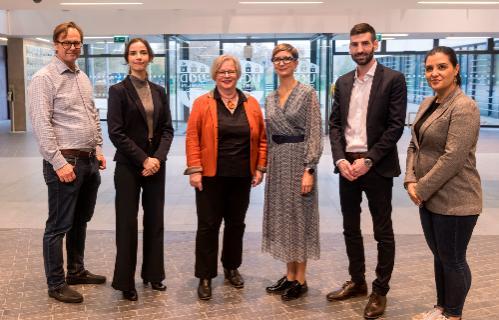 The European Research Council (ERC) funded RIGHTS-TO-UNITE project was launched at the UCD Sutherland School of Law on 8 November.
The European Research Council (ERC) funded RIGHTS-TO-UNITE project was launched at the UCD Sutherland School of Law on 8 November.
The €2.5 million project commenced in January 2024 and revives the people’s component of European Integration theory, guided by the question whether EU derived rights are used by individuals in everyday life and how this can promote or disrupt societal integration at local, national and European levels.
Focusing on small states within the EU (Czechia, Greece, Ireland, and Sweden) and neighbouring regions (Northern Ireland, Georgia, North Macedonia, and Norway), the team has a unique lens to examine how legal frameworks impact societal cohesion. The research promises groundbreaking insights into the role of law in a fractured EU.
Attending the launch, Prof Kate Robson Brown, Vice President for Research, Innovation and Impact, said, “Congratulations to the RIGHTS-TO-UNITE team led by Professor Dagmar Schiek. UCD is committed to promoting impactful, socially responsible research and we currently have 34 ongoing ERC grants across the university.
"This project is a great example of pioneering work from our community that is set to have a positive and lasting impact on society. It also highlights the importance of interdisciplinary research, and the integration of society and research.”
During the event, Prof Niamh Moore-Cherry, College Principal of UCD College of Social Sciences and Law, reinforced the vital role of interdisciplinary collaboration in advancing social justice initiatives.
 The first panel of the afternoon was chaired by Professor Brigid Laffan, who after retiring from the European University Institute in Florence now is the President of University of Limerick, with an impressive profile in European Studies. Professor Dagmar Schiek, Full Professor of EU Law and Labour Law at UCD Sutherland School of Law, and post-doctoral researchers Dr Audrey Plan and Dr Mary Naughton introduced the project ‘s key objectives and achievements to date, emphasising its unique focus on human interactions rather than institutional structures.
The first panel of the afternoon was chaired by Professor Brigid Laffan, who after retiring from the European University Institute in Florence now is the President of University of Limerick, with an impressive profile in European Studies. Professor Dagmar Schiek, Full Professor of EU Law and Labour Law at UCD Sutherland School of Law, and post-doctoral researchers Dr Audrey Plan and Dr Mary Naughton introduced the project ‘s key objectives and achievements to date, emphasising its unique focus on human interactions rather than institutional structures.
As a discussant Professor Imelda Maher, Director of UCD’s Dublin European Institute, explored the balance between governance and integration, raising questions on how rights can either unite or fragment societies.
The second panel on EU accession states, chaired by Professor Ben Tonra, UCD SPIRE, explored how legal frameworks shape social and political discourse in regions undergoing EU accession processes. Dr Lia Tsuladze, director of CSS (Centre for Social Sciences, Georgia) and Tbilisi State University, presented on the strategic use of Europeanisation by political actors in Georgia, and Dr Simonida Kacarska, director of EPI Skopje, examined the impact of EU accession instruments on rights in North Macedonia. Discussant Prof John O’Brennan ( NUI Maynooth), and director of the centre for European and Eurasian studies, offered perspectives on the EU’s recent approach to enlargement.
 The event also introduced PhD researchers – Aikaterini Katsaouni, Dragana Drndarevska and Lukáš Svoboda, who will be contributing to the project.
The event also introduced PhD researchers – Aikaterini Katsaouni, Dragana Drndarevska and Lukáš Svoboda, who will be contributing to the project.
Professor Dagmar Schiek said in closing, “As RIGHTS-TO-UNITE moves forward, it aims to contribute significantly to European studies by generating a new theory on the role of law in societal integration within and beyond the EU. The project is set to make a substantial impact not only on academic discourse but also on the practical application of rights, fostering a more integrated and cohesive Europe.”